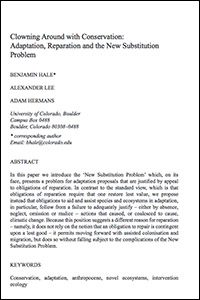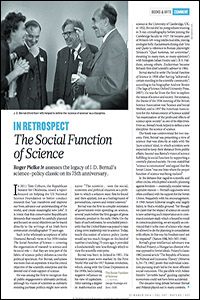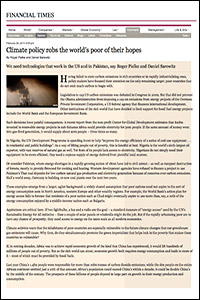New Publications |
Excerpt: In August 1968, protestors from the Students for a Democratic Society — an activist movement in the United States — repeatedly hurled the phrase ‘the whole world is watching’ outside the hotel in Chicago where the Democratic National Convention was being held. As Columbia University professor Todd Gitlin later documented in a book titled by the same phrase, media coverage of the clashes accompanying the refrain then served to draw wider visibility to their antiwar activities and claims. He found that implications from the media representations were twofold: first, coverage largely framed the protests as a fringe action promoted by marginalized actors; however, second, the increased media coverage of the Students for a Democratic Society actions actually boosted awareness and bolstered member enrolments in the student-led movement. Read more... |
Culture, Politics and Climate Change: How Information Shapes our Common Future Focusing on cultural values and norms as they are translated into politics and policy outcomes, this book presents a unique contribution in combining research from varied disciplines and from both the developed and developing world. This collection draws from multiple perspectives to present an overview of the knowledge related to our current understanding of climate change politics and culture. It is divided into four sections – Culture and Values, Communication and Media, Politics and Policy, and Future Directions in Climate Politics Scholarship – each followed by a commentary from a key expert in the field. The book includes analysis of the challenges and opportunities for establishing successful communication on climate change among scientists, the media, policy-makers, and activists. With an emphasis on the interrelation between social, cultural, and political aspects of climate change communication, this volume should be of interest to students and scholars of climate change, environment studies, environmental policy, communication, cultural studies, media studies, politics, sociology. Read more... |
Abstract: This paper investigates the beliefs and framing strategies of interest groups during a period of policy change and the factors explaining policy change. We develop propositions to explore questions concerning policy change primarily from the advocacy coalition framework as well as from other theories. The propositions are tested by examining the promulgation of a Colorado regulation requiring the disclosure of chemicals used in hydraulic fracturing. Using coded data of documents published by organizations involved in the rulemaking process, we find divergence between industry and environmental groups on their beliefs concerning hydraulic fracturing, as well as their portraying themselves and each other as heroes, victims, and villains, but some convergence on their more specific beliefs concerning disclosure of chemicals. Interviews point to the importance of policy entrepreneurs, timing, a negotiated agreement, and learning for explaining policy change. The findings provide both theoretical and methodological insights into how and why policy changes. Read more... |
Excerpt: Of the 4.9 million barrels of crude oil discharged into the Gulf of Mexico during and immediately after the Deepwater Horizon disaster, an impressive 41% of the oil was removed through human intervention. Such interventions included not only chemical dispersion (accounting for approximately 16% of the discharge), in situ burning (5%), and skimming (3%), but also a significant portion was captured directly from the well (17%). Researchers estimate that another 37% of the oil disappeared naturally, either through natural dispersion (13%) or through evaporation or dissolution (24%). As the remaining 22% of the oil continues to float in the gulf and threaten wildlife, the cost of the cleanup is expected to pass $41 billion (Hagerty and Ramseur 2010). Notwithstanding these economic costs, many lives, human and non-human, have been affected by the spill. Countless sea critters, including fish and marine mammals, died gruesome deaths or ended up with genetically abnormal offspring. Fish, shrimp, and oyster stocks were decimated (in the literal sense of the term). More than 3,000 miles of beach and wetland areas were bathed in oil. Recreation in the area took an incredible hit. The devastation is tremendous, and those responsible for the event-British oil giant BP, primarily-are on the hook to clean it all up. Many people want to say this: that pollution is wrong. Typically, they say this on harm grounds: Pollution is wrong because it is harmful to other people, to animals, or to nature more generally. This seems about right. Environmental damage is a serious consequence of polluting and it would seem wrong to impose it unjustifiably. These same people may have similar views about elephant poaching and rampant suburban expansion, to take just two examples, though such cases are not instances of pollution. That is, they may think that what makes poaching and rampant expansion wrong is also that it destroys the environment. In this way, pollution is just one of several forms of environmental wronging. Read more... |
 Ben also authored a new article, Clowning Around with Conservation: Adaptation, Reparation and the New Substitution Problem, with Alexander Lee, and Adam Hermans, Environmental Values 23 (2) 181-198, Published April 2014. Abstract: In this paper we introduce the ‘New Substitution Problem’ which, on its face, presents a problem for adaptation proposals that are justified by appeal to obligations of reparation. In contrast to the standard view, which is that obligations of reparation require that one restore lost value, we propose instead that obligations to aid and assist species and ecosystems in adaptation, in particular, follow from a failure to adequately justify – either by absence, neglect, omission or malice – actions that caused, or coalesced to cause, climatic change. Because this position suggests a different reason for reparation – namely, it does not rely on the notion that an obligation to repair is contingent upon a lost good – it permits moving forward with assisted colonisation and migration, but does so without falling subject to the complications of the New Substitution Problem. Read more... Ben also authored a new article, Clowning Around with Conservation: Adaptation, Reparation and the New Substitution Problem, with Alexander Lee, and Adam Hermans, Environmental Values 23 (2) 181-198, Published April 2014. Abstract: In this paper we introduce the ‘New Substitution Problem’ which, on its face, presents a problem for adaptation proposals that are justified by appeal to obligations of reparation. In contrast to the standard view, which is that obligations of reparation require that one restore lost value, we propose instead that obligations to aid and assist species and ecosystems in adaptation, in particular, follow from a failure to adequately justify – either by absence, neglect, omission or malice – actions that caused, or coalesced to cause, climatic change. Because this position suggests a different reason for reparation – namely, it does not rely on the notion that an obligation to repair is contingent upon a lost good – it permits moving forward with assisted colonisation and migration, but does so without falling subject to the complications of the New Substitution Problem. Read more... |
Excerpt: Issues related to immigration and citizenship have long been debated in the United States, and are reemerging as a political issue, with calls for reform coming from both Republicans and Democrats. President Obama says that “the US immigration system is broken … there are 11 million people living in the shadows.” One consequence of the broken immigration system can be seen in US soccer, where certain immigrants to the United States are deemed ineligible to represent Team USA, despite meeting FIFA criteria for eligibility. This article explains this situation and recommends several alternative ways forward to better align the intent of FIFA regulations with their implementation in a US context by US Soccer. Read more... |
Excerpt: In 2011 Tom Coburn, the Republican Senator for Oklahoma, issued a report focused on helping the US National Science Foundation to better conduct research that “can transform and improve our lives, advance our understanding of the world, and create meaningful new jobs”. It is ironic that this conservative Republican’s demands that research be carefully planned and focused on social objectives can be traced directly to the writings of an Irish-born communist crystallographer 75 years ago. Such is the wholesale acceptance of John Desmond Bernal’s views in his 1939 treatise The Social Function of Science — covering the organization of research to science and its social role — that they are now part of the fabric of science-policy debates across the political spectrum. For Bernal, usefulness was more than an aspiration: it was the central objective of the scientific enterprise and the desired end of state support of science. He was among the first to recognize that all public engagement is ultimately political, although his vision of scientists as stalwarts resisting partisan politics might now seem naive: “The scientist … sees the social, economic and political situation as a problem to which a solution must first be found and then applied, not as a battleground of personalities, careers and vested interests.” Read more... |
Excerpt: Having failed to stem carbon emissions in rich countries or in rapidly industrialising ones, policy makers have focused their attention on the only remaining target: poor countries that do not emit much carbon to begin with. Legislation to cap US carbon emissions was defeated in Congress in 2009. But that did not prevent the Obama administration from imposing a cap on emissions from energy projects of the Overseas Private Investment Corporation, a US federal agency that finances international development. Other institutions of the rich world that have decided to limit support for fossil fuel energy projects include the World Bank and the European Investment Bank. Such decisions have painful consequences. A recent report from the non-profit Center for Global Development estimates that $10bn invested in renewable energy projects in sub-Saharan Africa could provide electricity for 30m people. If the same amount of money went into gas-fired generation, it would supply about 90m people – three times as many. Read more... |








